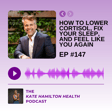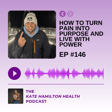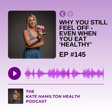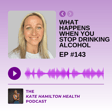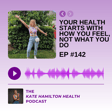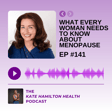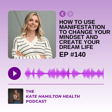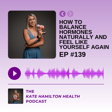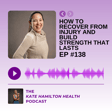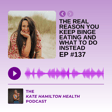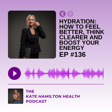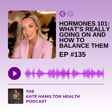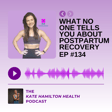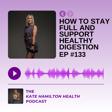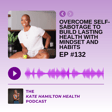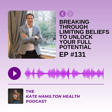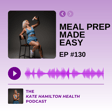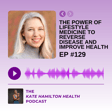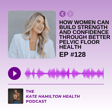
#123: Kayleigh Povey: Navigating sleep at every stage, from newborn to menopause
Are you struggling with sleep - whether you’re up with a newborn or wide awake during menopause? You’re not alone, and this episode is packed with support.
This week on the Kate Hamilton Health Podcast, I sit down with certified gentle sleep coach Kayleigh Povey, who brings over a decade of experience as a clinical psychosocial expert. We explore the full spectrum of sleep - from the chaos of baby wakeups to the hormonal sleep disruptions of perimenopause. Kayleigh shares her personal journey with sleep deprivation and how it led her to help families reclaim rest without guilt or unrealistic expectations.
We unpack how baby temperament, breastfeeding, and social media shape our sleep stories, and Kayleigh delivers practical, compassionate tools for improving sleep quality at every life stage. If you’re a new parent, approaching midlife, or just tired of being tired, this episode is your gentle permission slip to prioritize rest and build a healthier relationship with sleep.
EPISODE HIGHLIGHTS:
[0:17] Meet Kayleigh Povey: Gentle sleep coach with a psychosocial edge
[1:24] Why sleep is foundational for both parents and children
[3:33] Kayleigh’s journey through extreme sleep deprivation
[12:56] Newborn sleep tips: what works, what’s realistic
[19:15] How your baby’s temperament affects their sleep patterns
[26:31] Busting breastfeeding myths around infant sleep
[30:58] Letting go of guilt and the pressure to “get it right”
[32:34] Why you can (and should) trust your parenting instincts
[39:17] The dual challenge of parenting and perimenopause
[43:39] Supporting women’s health through hormonal shifts
[46:13] Quick, practical strategies to improve sleep quality
[52:43] Sleep hacks to get better rest starting tonight
Links & Resources:
If you enjoyed this episode, please subscribe, leave a review, and share it with friends who might benefit. For more health and fitness tips, follow me on Instagram and TikTok @katehamiltonhealth.
Disclaimer: This episode is for informational purposes only and is not intended as medical advice. I am not promoting or endorsing any specific product or supplement discussed in this episode. Always consult with your healthcare provider before starting any new supplement or health regimen.
Music b LiQWYD Free download: hypeddit.com/link/xxtopb [http://hypeddit.com/link/xxtopb] Promoted by FreeMusicPromo [https://www.youtube.com/channel/UCbycji-eySnM3WD8mbxPUSQ] / @freemusicpromo
